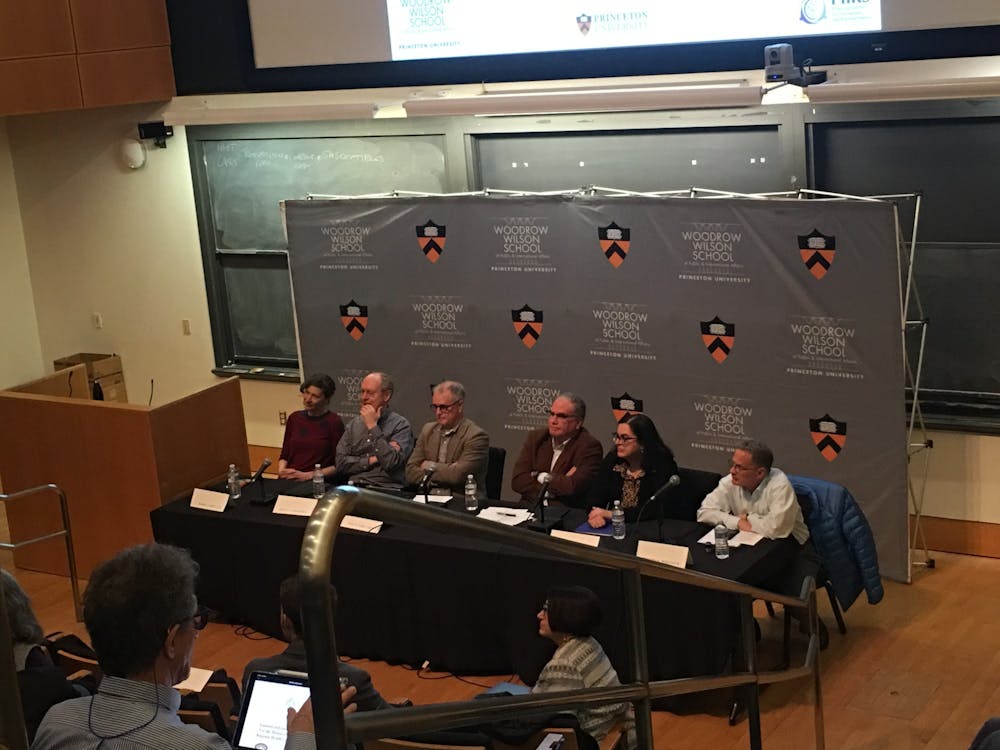As coronavirus (COVID-19) erupts into a global health crisis and strains the global economy, governments across the world are adopting measures that they hope will combat the virus’ spread. On Thursday, a University panel convened to discuss what those measures might be.
Speaking in a nearly full Friend Center Room 101, the panel, which included a physician, two pathology experts, and several University faculty members, discussed a variety of possible steps.
Hosted by the Wilson School and the Institute for International and Regional Studies and moderated by Miguel Centeno, Vice Dean of the Wilson School and the Musgrave Professor of Sociology, the event began with a description of the virus and possible measures to limit its impact.
“Strengthening health systems. That is one of the things that can make us prepared for these emergencies,” said C. Jessica Metcalf, Assistant Professor of Ecology and Evolutionary Biology and Public Affairs.
Metcalf explained that the global spread of the virus is affected in part by governments’ ability to detect infectious cases and manage them through containment, isolation, quarantine, and contact tracing.
More than 82,000 cases of COVID-19 have been confirmed in at least 48 countries, and nearly 3,000 deaths have been reported. The virus has sparked sharp declines in the global stock market: the S&P 500 dropped 4.4 percent Thursday, marking its worst loss on a single day in nearly nine years, while Dow industrials fell almost 1,200 points.
Newly confirmed cases of COVID-19 have appeared in Brazil, Algeria, and India, while the number of cases continues to rise in Europe and East Asia, disrupting major economic activities in the process. Experts have warned that the virus possesses an increasingly high potential to become a global pandemic.
Metcalf’s colleague, Professor Bryan Grenfell, the Kathryn Briger and Sarah Fenton Professor of Ecology and Evolutionary Biology and Public Affairs, added that the time of year, which influences climate and human behavior, also impacts global spread.

Focusing on the University’s response to the virus, Irini Daskalaki, a medical doctor and Physician Coordinator for Global and Community Health at University Health Services, shared ways to prevent the spread of viruses on campus.
“I cannot overemphasize measures like hand hygiene and cough etiquette,” she said. “They’re evidence-based, and they truly can help with lowering the rate of an outbreak.”
Daskalaki explained that the University has been working closely with the Princeton Health Department to address the health concerns of students and community members.
Visiting Lecturer in Public and International Affairs Douglas E. Mercado GS ’07 approached the subject from his background in international humanitarian assistance.

Mercado explained that COVID-19 is just one of several major issues drawing humanitarian attention in 2020. Presenting the calculations of a recent United Nations report, he showed that, within this year, approximately 167 million people will need humanitarian aid, the cost of which is estimated to reach $29 billion.
He remarked that problems like the locust invasion threatening food crops in East Africa are not receiving as much attention as the virus.
“It’s been kind of relegated to the back because everything is focused right now on the coronavirus,” Mercado said. “And I’m not saying that’s a bad thing, but I’m saying there are a lot of people out there who have got bigger worries than the coronavirus. One is having food tomorrow.”
David S. Wilcove, Professor of Ecology and Evolutionary Biology and Public Affairs, discussed the link between the international trade of wildlife and the COVID-19. He began his presentation by pointing to a photo of the Huanan Seafood Wholesale Market in Wuhan, China, where the COVID-19 is widely believed to have originated.
“This is the Wuhan seafood market,” he said, “which had a pretty expansive definition of seafood.”
While the species from which the virus originated is still uncertain, Wilcove said, the presence of internationally-sourced wildlife in close contact facilitated its emergence.
According to Wilcove, limiting wildlife trade will be challenging. The trade is a major economic force, and smuggling presents an obstacle to enforcing bans. Also, many people rely on wildlife products for traditional medicine and social conventions.
“To give you an example — shark fin soup, which has led to the death, for many years, of tens of millions of sharks every year, is viewed in some parts of the world as an important dish served, say at a wedding or another truly significant event,” Wilcove said.
Wilcove anticipates more restrictions on the sale of wildlife in China, as the Chinese government begins to shutter markets like Wuhan’s, but he remains skeptical about whether this will be sufficient in solving the problem of wildlife trade.
“And of course, undoubtedly, at this moment, there’s some Trump University graduate who is selling some other animal as a way to cure the coronavirus problem, ensuring that another animal is endangered by this sort of thing,” he joked.
The panel was held in Friend Center Room 101 at 4:30 p.m. on Thursday, Feb. 27.








